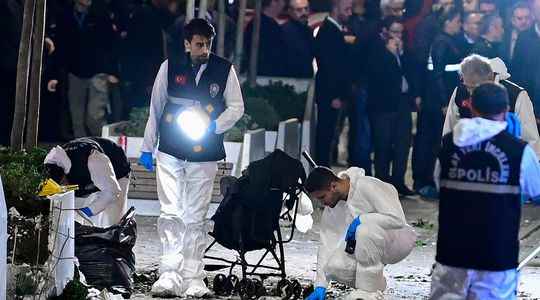Locals, tourists and strollers are used to filling the long Istiklal Avenue, Istanbul’s main artery. Sunday, in particular, is conducive to compact crowds. This November 13, in the middle of the afternoon, a bomb placed near a public bench came to sow horror there. The balance sheet, provisional, is six dead, including two children, and 83 injured.
Less than 24 hours after the tragedy, onlookers are already crowding into the shops on the avenue, a sign of the resilience of Turkish society as well as its sad habit of violence. Along the street, huge Turkish flags have been installed and a ballet of diplomatic vehicles comes to pay tribute to the victims. A few hundred meters away, in Taksim Square, around thirty young men from the far-right micro-party Zafer party unfurl a banner calling for stricter border control. During the night, the authorities arrested the one presented as the main suspect of the attack, a Syrian woman who had arrived in Turkey four months earlier.
In videos and photos of the attack, a young veiled woman is seen placing a bag near a park bench and then leaving the scene minutes before the explosion. The security forces quickly arrested her in an apartment in the Istanbul suburbs. In the early hours, the Turkish authorities blamed the Kurdish guerrillas of the PKK – and the main component of the Syrian Democratic Forces (SDF) which control most of northeastern Syria, the YPG – as responsible for the attack. . The Syrian Kurds denied on Monday any link with the attack, assuring that the young woman who committed it did not appear on their registers. In a tweet, Mazloum Abdi, commander-in-chief of the SDF, expressed “all his condolences to the victims and to the Turkish people”.
“The work of foreign powers hostile to Turkey”
The Turkish Minister of the Interior, Suleyman Soylu, does not budge: for him, this attack would have been coordinated from northern Syria, held by the Kurds of the SDF, close to the PKK. “The principals are in Kobané”, says this close friend of Recep Tayyip Erdogan, citing the city famous for its resistance against the jihadists of the Islamic State in 2014-2015 and which Turkey has been threatening to invade from the start of the year.
Near the site of the explosion, this version of the authorities convinced Çetin Emgen, an optician who works in the district. “This attack is the work of foreign powers hostile to Turkey”, assures this fifty-year-old, a bouquet of flowers in his hand. This Monday, he came to salute the memory of the victims “killed by the Americans”, according to him. A rhetoric similar to that deployed by the Minister of the Interior, who refused the condolences presented by the American embassy: “It is the assassin who returns to the scene of the crime”, asserted Suleyman Soylu, in reference to the support given by Washington to the Syrian Kurds.
After this attack, Greece also finds itself in the sights of the Turkish authorities. While tensions between Athens and Ankara have been high since the spring, Soylu says the suspect had planned to flee to Greece after the attack. By pointing the finger at its traditional enemies, Erdogan’s government is taking the risk of further polarizing Turkish society, but could win some nationalist votes, seven months before a presidential election that promises to be close.
